An Economist Gets Lunch: New Rules for Everyday Foodies
by Tyler Cowen
It has been about 30 years since Paul Levy and Ann Barr coined the term "foodie," about 20 years since the launch of TV's Food Network and more than 10 years since the publication of Eric Schlosser's alarming Fast Food Nation. Just as food trends have proliferated and become increasingly exotic and/or extreme, so have professional and amateur chefs increased in number and star power. Along with all of this, there has been a growing mountain of books, articles, scientific studies and documentaries about how everything we are eating is making us fat/starving the world/destroying the environment/killing us. Think your vegan, gluten-free locavore habits are saving your health and the planet? Don't tell that to advocates of the caveman diet or gastropub crawlers seeking rabbit rillettes and fois gras foam. With so much contradictory and often scary information being hurled around, what to believe and what to eat are increasingly at odds with what is satisfying, nourishing, and affordable. But there is hope. With his new book, An Economist Gets Lunch, Tyler Cowen offers a practical, informative and very tasty guide to the basic economics of food as well as how to get the most out of one's dining experience, whether in the home or out of it.
As an economist who has trained his focus on culture, Cowen finds a natural and inextricable link between food and economics. He posits that the commercialization of food is not to blame for terrible diets and "bad food" in America. Rather, he points to three social forces: Prohibition (which shut down most of the decent restaurants in the country), World War II (which created food shortages) and the "war against immigration, which... kept American food away from its best and most fruitful innovators for decades." In addition, Cowen argues, Americans tend to spoil and cater to the tastes of their children, who have sweet-seeking, unsophisticated palates.
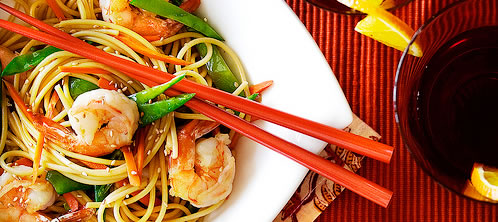
A passionate foodie himself, Cowen presents a simple premise: good food--available to anyone who wants to put in the effort to find it--doesn't have to be expensive, and food snobbery won't make it taste any better. To illustrate his point, Cowen describes his experience shopping for and eating a variety of cheap, delicious foods in Nicaraguan roadside tamale stands and markets. The same experience can be had, Cowen claims, much closer to home. But before that can happen, consumers need to change their shopping routines and eating habits. A good place to start, he says, is in the aisles of an ethnic supermarket. Cowen then takes readers on an extended tour of Great Wall, a Chinese market, where he shops exclusively for one week. Shopping in a place where labels are indecipherable and packaged food is mysterious demands mindfulness. It also encourages experimentation and reveals unexpected bargains. Produce, for example, is a fraction of standard supermarket price and is fresher at Great Wall.
The kitchen, however, is not the only place where consumers can have a positive and inexpensive gastronomic experience. In one of the liveliest sections of the book, Cowen offers several practical tips for finding good restaurants with excellent food. For example, he cautions readers to avoid places filled with laughing scenesters since those places are more about socializing than eating; instructs diners to ask waiters "What is best?" as opposed to asking "What should I get?"; and breaks down the simple economics of good and bad food deals (movie popcorn: bad, Starbucks coffee: good). The best food to be found in restaurants, Cowen claims, is the food with which America excels--barbeque. Foodies will delight as Cowen describes barbeque in all its forms and variations in mouth-watering detail.
In the last third of this fast-paced and fact-filled treatise, Cowen turns his attention to overturning both tconventional wisdom and current thinking about food as it relates to economics, the environment, and health. No doubt this section will generate the most controversy as Cowen offers a spirited defense of agribusiness, which he claims has saved many more lives than it has destroyed, and debunks the value of locavorism, which he claims is often economically unsound. Perhaps most contrarian, however, is Cowen's support of genetically modified organisms (GMOs), which, with their accompanying onslaught of negative press, have become a source of alarm across a broad swath of consumers. The potential benefits of GMOs, Cowen argues, include lower food prices and more nutritional crops which would enable the world's poorest people to eat.
To say that An Economist Gets Lunch provides food for thought would be to use the obvious and--sorry--cheesiest metaphor. Yet, this is precisely what Cowen does. No matter where one stands on the checkout line, one must make choices about what one eats every day. And when one is informed, one makes smart choices. This is not only good for the individual, but benefits society in general. An Economist Gets Lunch is a great place to start. -Debra Ginsberg



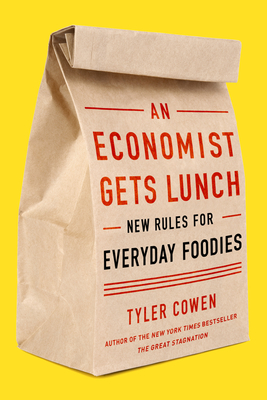
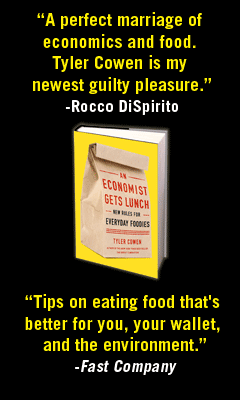
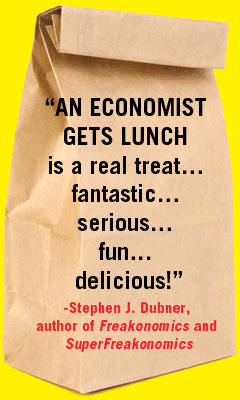
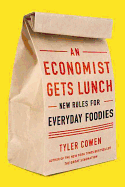


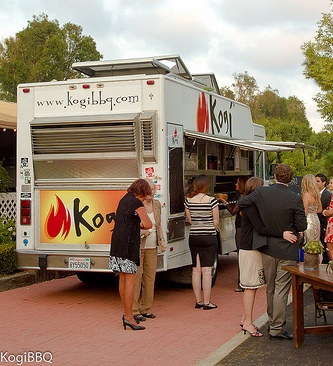 Try to introduce more serendipity into your food experiences, especially if you are an established foodie. Let someone else order for you. Hire a food truck to cater your next party in your house. Learn how to use mail order for the best ingredients. Avoid eating out in high-rent neighborhoods such as city centers, and stay off of the main avenues. Look for restaurants which are hard to find. Don't assume that pricier restaurants are better. Buy from suppliers who treat their animals well. Those are just a few tips.
Try to introduce more serendipity into your food experiences, especially if you are an established foodie. Let someone else order for you. Hire a food truck to cater your next party in your house. Learn how to use mail order for the best ingredients. Avoid eating out in high-rent neighborhoods such as city centers, and stay off of the main avenues. Look for restaurants which are hard to find. Don't assume that pricier restaurants are better. Buy from suppliers who treat their animals well. Those are just a few tips.